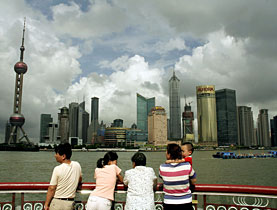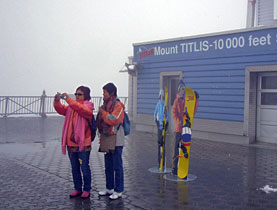Sino-Swiss tourism becomes a one-way street

Chinese tourism to Switzerland is soaring, with more visitors coming and staying longer, but traffic in the other direction is stalling under the economic crisis.
The Chinese are bucking the general downward trend in overnight stays by foreign tourists. They posted a 34 per cent increase in August this year, compared with the same month in 2008, according to the Federal Statistics Office.
The same report shows that foreign visitor stays overall fell by 4.5 per cent, with the biggest decreases among visitors from the Gulf states, Britain and the United States.
The surge in Chinese visitors is something for Simon Bosshart, director of Switzerland Tourism in Beijing, to smile about.
“We need to forget about 2008. It was a bad year because of the euro, the Olympic Games, the Sichuan earthquake,” he told swissinfo.ch.
“We are focussing on 2009, which has had a great start. Actually, we have not felt the effects of the economic crisis, as China seems to have been able to overcome it. It is now that we are doing our best business, between September 20 and October 15.”
The Chinese public have been given an extended holiday during this period to mark the 60th anniversary of the founding of the People’s Republic of China on October 1, with many people able to take ten days off work.
Negative reporting
Of those travelling to Europe, more and more Chinese are choosing Switzerland as their sole destination on the continent – despite the recent Swiss entry into the Schengen zone, which makes it easier for tourists to visit several different European countries.
Last year, Switzerland matched Greece as the top one-stop European destination for Chinese visitors. And they are staying longer.
“When I started at Switzerland Tourism in Beijing in 2006, Chinese tourists spent one night in Switzerland, at the most two. Today, the trend is clearly for longer stays,” says Bosshart.
While the Chinese love Switzerland and many now have the means to get there, the reverse is not the case. “We are seeing a decline in bookings of about 15 per cent compared with last year,” said Hong Jiang of the Kuoni travel agency in Zurich.
“Unfortunately, the market for China has not recovered in recent years. There are a number of reasons, but mainly because of negative reports in the media,” said Prisca Huguenin-dit-Lenoir of the Glattbrugg-based Wettstein, a tour operator for the Travelhouse group.
“The economic crisis has begun to take its toll, first on business travel and soon afterwards on tourist travel in general,” added François Leresche, head of the Voyages et Culture agency in Lausanne. “Next year will certainly be very difficult for all travel, including to China.”
Leresche says “disinformation and lies broadcast by the Western press” about the unrest and ethnic tensions in Xinjiang have had negative effects on tourism.
In Beijing, Veronique Ducassy heads the Kuoni Destination Management agency, which handles travel to China. She says 2008 was already “very difficult”, and 2009 is even worse – a situation she blames on the global financial crisis rather than politics.
“We currently have groups in Xinjiang and Tibet. No one has cancelled this year because of events.”
Visa restrictions
It is unclear whether the extreme security measures imposed by Beijing for the 60th anniversary have deterred travellers. No one was able to confirm rumours that the authorities clamped down on the number of tourist visas issued.
“The Chinese government is far less restrictive and bureaucratic towards Swiss tourists than the Swiss government is towards Chinese tourists,” notes Leresche.
Indeed, Hervé Findeisen, the head of the visa section of the Swiss embassy in Beijing, acknowledges that Switzerland’s entry into the Schengen area has somewhat restricted its room for manoeuvre, even if “every Chinese citizen is entitled to request and receive a visa”.
Eric Piatti, the managing director of the Swissôtel in Beijing said none of his customers had experienced a problem obtaining a visa for China. Swissôtel, however, is located outside the temporary security perimeter set up for the October 1 celebrations and it has been business as usual in recent weeks, while other hotels under Swiss management were forced to shut up shop and were under strict instructions not to speak to media.
And Piatti is even optimistic about the future: “I have seen a slight recovery since August 20. The occupancy rate appears slightly up. It looks as though we have turned the corner.”
Alain Arnaud in Beijing swissinfo.ch (Adapted from French by Jessica Dacey)
CHINESE IN SWITZERLAND
Chinese tourists account for little more than 1% of all overnight stays by foreigners. But the development potential is considered huge and the Chinese are in second position with their average daily expenditure of $430, just behind the Gulf states.
In 2004 Beijing’s decision to grant European Union members and Switzerland “Approved Destination Status” (ADS) opened the door for everyone in China who could afford a trip to Europe, since they no longer needed to apply for special travel permission from their government.
Switzerland Tourism opened the first European tourist information office in Beijing.
To date, Chinese tourists have chosen to visit in guided groups as part of a European itinerary, but tour operators say more people are starting to come on their own.
According to a study conducted by Presence Switzerland, standard of living, political stability and attractive scenery, combined with an environmentally friendly attitude, all combine to form part of the positive image that Switzerland enjoys in China.
In August 2008, the Swiss embassy in Beijing issued 4,538 tourist visas.
In August 2009, there were only 229 issued for Switzerland out of a total of 1,666 visas issued in all categories.
After joining the Schengen area, Switzerland decided only to issue visas to Chinese nationals who make the alpine nation their main destination. In these cases, applications undergo more extensive checks than before Schengen. The refusal rate is about 0.4% today, according to the head of the visa section of the Swiss embassy in Beijing, Hervé Findeisen.

In compliance with the JTI standards
More: SWI swissinfo.ch certified by the Journalism Trust Initiative













You can find an overview of ongoing debates with our journalists here . Please join us!
If you want to start a conversation about a topic raised in this article or want to report factual errors, email us at english@swissinfo.ch.